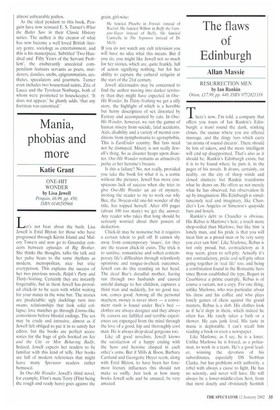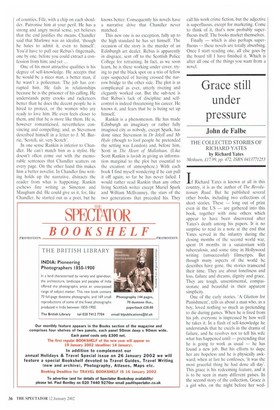The flaws of Edinburgh
Allan Massie
RESURRECTION MEN by Ian Rankin
Orion, £17.99, pp. 440. ISBN 0752821318
There's now, I'm told. a company that offers you tours of Ian Rankin's Edinburgh: a trawl round the dank, stinking closes, the saunas where you are offered massage, and the dingy bars which carry 'an aroma of soured dreams'. There should be lots of takers, and the more intelligent will end up disappointed. That's also as it should be. Rankin's Edinburgh exists; but it is to be found where he puts it, in the pages of his novels. It draws, certainly, on reality, on the city of sharp winds and closed shutters; but Rankin transforms what he draws on. He offers us not merely what he has observed, but observation lit up by imagination. His Edinburgh is simultaneously real and imaginary, like Chandler's Los Angeles or Simenon's quayside bars and hotels.
Rankin's debt to Chandler is obvious. His Rebus is Marlowe's heir, a touch more shop-soiled than Marlowe, but like him 'a lonely man, and his pride is that you will treat him as a proud man or be very sorry you ever saw him'. Like Marlowe, Rebus is not only proud, but, contradictory as it may seem, given to self-pity. Actually it's not contradictory, pride and self-pity often going together in 'real life' too, and being a combination found in the Romantic hero since Byron established the type, Bogart in Casablanca a prime example. Rebus is of course a variant, not a copy. For one thing, unlike Marlowe, who was particular about his dress and his coffee and who plays lonely games of chess against the grand masters, Rebus is a slob. His clothes look as if he'd slept in them, which indeed he often has. He rarely takes a bath or a shower. He eats junk food. His taste in music is deplorable. I can't recall him reading a book or even a newspaper.
Like Marlowe, as I say, he is a loner. Unlike Marlowe he is forced, as a policeman, to work in a team. He's a good leader, winning the devotion of his subordinates, especially DS Siobhan Clarke, but has problems with authority, a rebel with always a cause to fight. He has no serenity, and never will have. He will always be a lower-middle-class Scot, from that most dourly and obstinately Scottish of counties, Fife, with a chip on each shoulder. Patronise him at your peril. He has a strong and angry moral sense, yet believes that the end justifies the means. Chandler said that Marlowe was an idealist, 'though he hates to admit it, even to himself'. You'd have to pull out Rebus's fingernails, one by one, before you could extract a confession from him; and yet ...
One of his most attractive qualities is his degree of self-knowledge. He accepts that he would be a nicer man, a better man, if he wasn't a policeman. The job has corrupted him. He fails in relationships because he is the prisoner of his calling. He understands petty crooks and racketeers better than he does the decent people he is hired to protect, or the women who are ready to love him. He even feels closer to them, and that he is more like them. He is, however romanticised, nevertheless convincing and compelling; and. as Stevenson described himself in a letter to J. M. Barrie, 'Scotch, sir. very Scotch'.
In one sense Rankin is inferior to Chandler. He can't match him as a stylist. He doesn't often come out with the memorable sentences that Chandler scatters on every page. On the other hand this makes him a better novelist. In Chandler fine writing holds up the narrative, distracts the reader from what is happening. Rankin eschews fine writing as Sime non and Maugham did. He could give us it, for, like Chandler, he started out as a poet, but he knows better. Consequently his novels have a narrative drive that Chandler never matched.
This new one is no exception, fully up to the high standard he has set himself. The occasion of the story is the murder of an Edinburgh art dealer. Rebus is apparently in disgrace, sent off to the Scottish Police College for retraining. In fact, as we soon learn, he is there working under cover, trying to put the black spot on a trio of fellow cops suspected of having crossed the narrow bridge to the other side. The plot is as complicated as ever, utterly riveting and elegantly worked out. But the sub-text is that Rebus's lack of discipline and selfcontrol is indeed threatening his career. He knows it, and fears that he is being set up himself.
Rankin is a phenomenon. He has made Edinburgh an imaginary or rather fully imagined city as nobody, except Spark, has done since Stevenson in Dr Jekyll and Mr Hyde (though to fool people he pretended the setting was London) and, before him, Scott in The Heart of Midlothian. (Like Scott Rankin is lavish in giving us information marginal to the plot but essential to the creation of atmosphere.) With each book I find myself wondering if he can pull it off again; so far he has never failed. I would rather read Rankin than any other living Scottish writer except Muriel Spark and William McIlvanney, the stars of the two generations that preceded his. They call his work crime fiction, but the adjective is superfluous, except for marketing. Come to think of it, that's now probably superfluous itself. The books market themselves.
Finally — which is also perhaps superfluous — these novels are totally absorbing. Once I start reading one, all else goes by the board till I have finished it. Which is after all one of the things you want from a novel.



























































 Previous page
Previous page